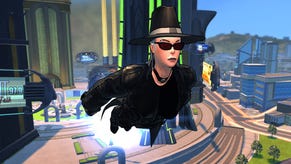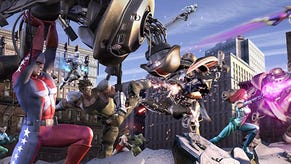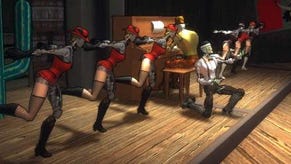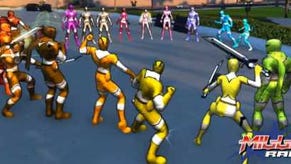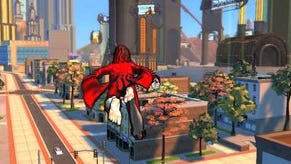They Are The Champions Online: Jack Emmert
If any single figure's connected in the public mind with Cryptic games, it's its oft-outspoken Chief Creative Officer, Jack Emmert. While he was particularly busy showing off his new child to anyone in the buliding, we managed to grab him to talk about the interface between online MMOs and Pen and Paper games, the biggest challenges of Champions and the sacred cow of MMO design that's next for the slaughterhouse.
RPS: For me, there's an interesting synergy between the world of Pen & Paper roleplaying and games now. You make a game of champions – and Hero games are making your content into the game world. Warcraft turning into pen-and-paper roleplaying games. Would you agree?
Jack Emmert: I can name several – World of Darkness which is being made by the CCP guys. Obviously Warhammer online is a miniature wargame, not a role playing game and then there's the fourth edition of Dungeons of Dragons which is clearly – though they're denying it vociferously – inspired by MMOs. There's a back and forth, and I think it's for very simple reason – RPGs created MMOs. The reason why the industry started in the first place was because of an outgrowth of the text only games. The text only games came because people couldn't find friends to play their D&D games with. And it slowly marches forward... though interestingly enough, D&D started as a miniature wargame, before it became a roleplaying agme, where you play-act a character. MMOs, to people my age, in their thirties or forties hark back to their days of people around a table. But the younger generation typically know the idea of MMOs from games they've been playing either on consoles or PC for decades.
RPS: I had an odd cultura game moment last year. In a long debate thread over what an RPG was, someone butted in, claiming that everyone was wrong, and their mistake is a common one: “Role-playing” assumes to people taking a role in a team, like Tank or healer or similar.
Emmert: That's explicitly not true. In Chainmail – which came before D&D – role-playing refered to playing a role of a character.
RPS: One advantage of taking Pen and Paper to fuel an MMO is the matter of content. MMOs demand worlds. When something like Champions comes with twenty-five years of worldbuilding, that's a serious boon.
Emmert: Yeah, you can just lift it. You don't have to create it from whole cloth. It's great to imagine things and it's great to imagine your own world... but it's expensive. To pay people to come up with it, to come up with the concept art... and for someone else to pretty much done that work for you, great!
RPS: My reading of Cryptic is that you tend to be Pen and Paper guys, with a lot of staff coming from that backdrop. However, now you're making something that's much more an action game. That's a real challenge.
Emmert: It's one of the reasons why we did it. To be honest, you've hit on the thing which was toughest for me as a designer. I broke out every possible action RPG I could – and Spider-man games, Incredible hulk games, God of War games, Shadow of the Colossus... I just started playing all of those, and looking at them not as a fan, but as a designer. How can I get some of these elements into an MMO in a way which preserves the genre, but still captures the essence? It's the biggest challenge for us as a company.
RPS: After you analysed it, what was the core?
Emmert: For an action RPG, a player has to be able to react. Instead of an MMO, which is essentially a statistical battle between your numbers and the critter's numbers, where my movement and actions really don't account for a whole lot... that's not true in an action RPG. I leap over here, I block this and escape this area attack. That's what it's about. I, as a player, need to be able to predict the ability of who I'm fighting – it has a predictable behaviour that I can counter by something I do. Not necessarily by the powers I have or the statistics I've built up or the potions I've taken... but by actual physical reactions.
RPS: We were talking about this during lunch earlier, but I hoped you'd expand a little. There was recent arguments about why there's so few console-inclusive RPGs, and the accepted wisdom seemed to be that it's because they have to have 4 years development cycle, which is basically a console's generation. But you said you could do it quicker than that...
Emmert: I said it'd be 2 years or less. We developed City of Villains in eight months. It's basically... here's a business tip. Don't keep building new engines. Take an engine, and improve it. Make three, four, five games out of it before you need to reboot. That's a business thing. The second thing is just [improving] game mechanics – we know that forced teaming doesn't work – or rather, isn't necessary for a successful game. EQ did it, and everyone thought that's what you had to do. If you recall, Dark Age was somewhat forced grouping and CoH had a touch of it... but World of Warcraft is pretty much solo-able up to the end game. And that's totally fine. And actually would have thought that was forbidden beforehand, and I fell in to that trap myself. There are a lot of lessons we've learned, but I still think MMOs have a long way to go before they learn the lessons of FPS or even traditional RPGs, simply because there's so few that launch. So the learning that we get is very incremental – it really just depends on how many games are out there.
RPS: The commercial MMO is one of the last genres to go fully commercial... and even them, they appear so slow. In terms of development, if we're the FPS, we're probably only up to 97-98, at best. I mean, are we pre-half-life or post-half-life?
Emmert: It's interesting as MMOs only /started/ in 99. Everquest hit 400,000 – or somewhere around there – and obviously WoW significantly broke that. I'm talking North America and the US- I can't speak to the Asian games, as I don't know that market as well. In any given year, how many big MMO releases are there? We've only had a few so far this year. We've had Pirates of the Burning Sea. Conan.... it's really tough. You have that many first-person shooters that launch in a week. It's astonishing.
RPS: You talked about Sacred cows earlier. What do you think the next to fall will be?
Emmert: I don't think right now MMOs give players enough creative freedom. And I think in the future user-generated content is going to be providing the replayability. I think right now, even because of technical fears or design considerations, MMOs are still being designed as if they were a typical product with a lifespan – as in, here's our storyline, here's our game - just enjoy it like a work of art. It's possible – it's not wrong, but I think it's going to change.
Our Champions coverage will continue tomorrow with an interview with George MacDonald, designer of the original Pen and Paper Champions game.




